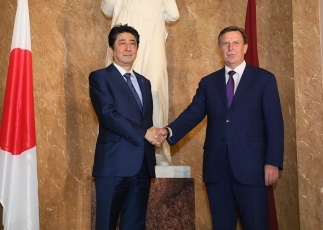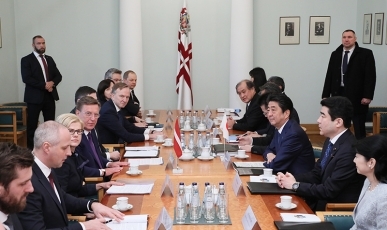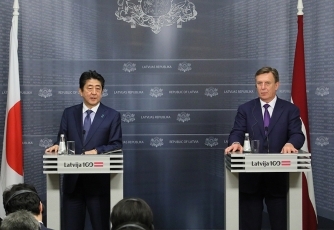Japan-Latvia Relations
Japan-Latvia Summit Meeting
January 13, 2018
 Photograph of the leaders shaking hands
(Photo: Cabinet Public Relations Office)
Photograph of the leaders shaking hands
(Photo: Cabinet Public Relations Office)
 Photograph of the Japan-Latvia Summit Meeting
(Photo: Cabinet Public Relations Office)
Photograph of the Japan-Latvia Summit Meeting
(Photo: Cabinet Public Relations Office)
 Photograph of the joint press announcement
(Photo: Cabinet Public Relations Office)
Photograph of the joint press announcement
(Photo: Cabinet Public Relations Office)
On January 13, commencing at 11:10 a.m. (local time; 6:10 p.m. Japan time) for approximately 45 minutes, Mr. Shinzo Abe, Prime Minister of Japan, who was visiting Latvia, held a summit meeting with H.E. Mr. Māris Kučinskis, Prime Minister of Latvia. The overview is as follows.
- At the beginning, Prime Minister Kučinskis welcomed Prime Minister Abe’s first visit to Latvia in this commemorative year, which marked the 100th anniversary of the declaration of independence of Latvia. Prime Minister Abe replied that he was extremely pleased to visit Latvia for the first time as Prime Minister of Japan in this memorable year, just one month after the invitation to visit the country extended to him during Prime Minister Kučinskis’ visit to Japan. Prime Minister Abe explained that North Korea currently posed a grave threat to the entire Europe, and he would like to work closely together in addressing international challenges. Prime Minister Abe also stated that an economic mission was accompanying him on this visit and that he would like to strengthen economic relations between Japan and Latvia, which was the logistics center of the Baltic Sea. The two leaders confirmed they would further develop and strengthen longstanding and friendly relations between the two countries.
- With regard to bilateral relations, the two leaders shared the view that they would cooperate in invigorating the trade and investment relations through initiatives such as dispatching a Japan External Trade Organization (JETRO) business mission, and in further strengthening people-to-people exchanges, including a prompt start of discussions on a working holiday program. They also confirmed that they would strengthen cooperation in the fields of science and technology as well as higher education. In addition, the two leaders shared the view that they would further deepen discussions on security between Japan and Latvia, including through opportunities such as the visit to Japan of Mr. Raimonds Bergmanis, Minister of Defense of Latvia, which was planned for the near future. Furthermore, the two leaders shared the view that they would establish the Japan-Baltic Cooperation Dialogue (note) in order to further advance cooperation between Japan and the Baltic States.
- As for Japan-European Union (EU) relations, the two leaders confirmed that the maintenance and strengthening of the international order based on the rule of law is a diplomatic and security challenge of the utmost importance that Japan and Europe, who share fundamental values, need to address in cooperation in the face of various challenges. The two leaders also confirmed that they would continue to work together to realize the early entry into force of the Japan-EU Economic Partnership Agreement (EPA) so as to further promote the trade and investment relations between Japan and Latvia.
- Regarding North Korea issues, the two leaders confirmed that they would not accept a nuclear-armed North Korea, and that it was necessary to maximize pressure on North Korea. Prime Minister Abe also requested Latvia’s understanding on the importance of promptly resolving the abductions issue.
- The two leaders also exchanged views on maritime security.
- In addition, following the summit meeting, Prime Minister Abe attended a lunch meeting hosted by Prime Minister Kučinskis, which the accompanying Japanese business delegation also attended.
- (Note) The “Japan-Baltic Cooperation Dialogue”
- A dialogue framework for promoting cooperation between Japan and the Baltic countries in a variety of fields in the future that Prime Minister Abe agreed to establish with the leaders of the three Baltic States when he visited them in January this year for the first time as Prime Minister of Japan. (Participation from the public and private sectors is envisaged).

